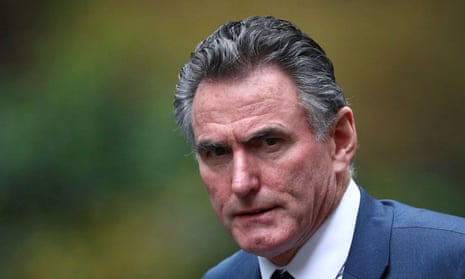Royal Bank of Scotland’s chief executive, Ross McEwan, has resigned after five and a half years in the job, saying now is the “right time” to leave.
The 61-year-old New Zealander has a 12-month notice period and will remain at the helm of the bank, which is still 62%-owned by the UK government, until a successor has been found and an “orderly handover has taken place”. RBS will announce a formal departure date soon, along with the details of McEwan’s final pay package.
The bank’s chair, Howard Davies, said McEwan’s strategy to simplify RBS and refocus it on the UK and Ireland had “helped to deliver one of the biggest UK corporate turnarounds in history”.
He said: “Ross has worked tirelessly to make the bank stronger and safer and played the central role in delivering a return to profitability and dividend payments to shareholders. The board and I are grateful for the huge contribution Ross has made in one of the toughest jobs in banking.”

Alison Rose, who runs RBS’s commercial and private banking division, is the internal favourite to take over from McEwan. Davies said the bank would conduct a full internal and external search.
Rose has worked for RBS for more than 20 years and was also promoted to deputy CEO of NatWest Holdings, the bank’s ringfenced holding company, which houses RBS’s retail and corporate banking, in December. This means she has been deputising for McEwan and advising on strategic projects.
When McEwan took the helm in 2013, the bank was loss making and had businesses in 30 countries. Since then it has closed hundreds of branches and only operates in 12 countries. He returned it to profit two years ago and doubled annual profits to £1.6bn in 2018. In October RBS paid its first dividend since its £45bn state bailout in 2008. The Treasury plans to sell the entire public stake by 2023-24.
McEwan said: “After over five and a half very rewarding years, and with the bank in a much stronger financial position, it is time for me to step down as CEO.
“It is never easy to leave somewhere like RBS. However, with much of the restructuring done and the bank on a strong and profitable footing, I have delivered the strategy that I set out in 2013 and now feels like the right time for me to step aside and for a new CEO to lead the bank.”
However, shareholders attending the bank’s annual general meeting in Edinburgh on Thursday afternoon criticised McEwan, particularly over his handling of the scandal around the mistreatment of small business customers by RBS’s former Global Restructuring Group (GRG).
Neil Mitchell said the bank had “sucked the lifeblood” from some small businesses and that some of its customers had killed themselves because of the treatment they had received from GRG.
Mitchell also pointed out that shares in RBS had fallen 29% since McEwan was appointed chief executive on 1 October 2013. Another shareholder, Clive Murray, said McEwan had “positively failed” in his pledge to restore trust in the bank.
Climate campaigners protested outside the meeting, which was held at RBS’s Gogarburn headquarters on the outskirts of Edinburgh. Davies said RBS had financed more renewable energy transactions in the UK over the past decade than any other UK bank.
McEwan said at the often ill-tempered meeting that lack of clarity over Brexit was likely to weigh on the bank’s performance. He said: “The continued uncertainty is holding back the UK economy, with the most recent forecasts pointing to subdued GDP growth rates relative to historic[al] trends. As a large predominantly UK-focused bank, our results will of course reflect the economic performance of the UK.”
Gary Greenwood, an analyst at Shore Capital, was more positive about McEwan’s record. He said: “While significant further work remains to improve profitability and returns, we believe that RBS is now in much better shape than when Mr McEwan took over.”
John Cronin at Goodbody said McEwan had done a “stellar job bringing RBS back from the brink and we are sorry to see him go”.
A number of internal candidates had been groomed to take over at RBS, Cronin said, and shareholders would be “highly supportive” if Rose, the frontrunner, was appointed.
